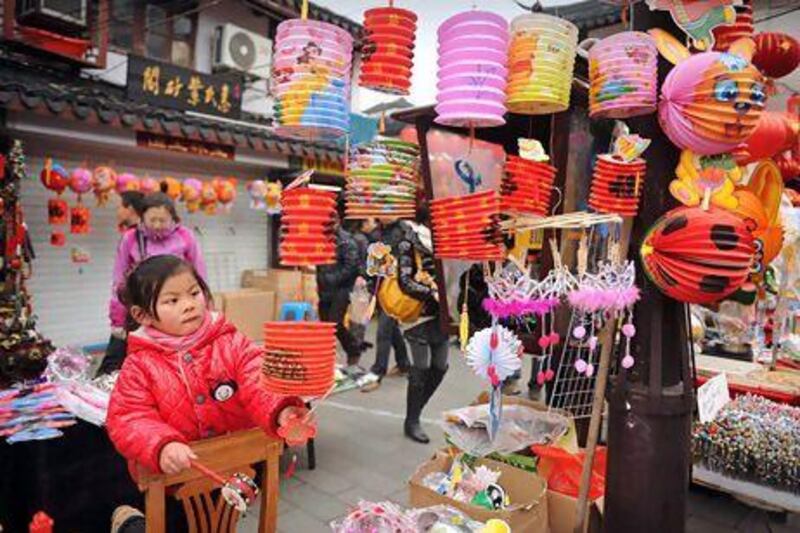Shop and restaurant sales in China during the week-long Lunar New Year festival rose at the slowest pace in four years as a government crackdown on extravagant spending by officials limited outlays on food and drink.
Retail sales at outlets monitored by the ministry of commerce increased 14.7 per cent in the February 9 to February 15 period from the year-earlier break to 539 billion yuan (Dh317.4bn), according to a statement on its website yesterday.
That was down from a 16.2 per cent pace last year and the least since a 13.8 per cent gain in 2009, according to previously released figures.
The New Year holiday, comparable to the peak Christmas shopping rush in the United States, is a period when consumers in the world's second-biggest economy splurge on food, jewellery and gifts, and government officials are wined and dined. Sales may have been damped by a campaign started by Xi Jinping, the new head of the Communist Party, to rein in lavish spending while rising incomes are prompting more Chinese to travel overseas.
"The slower growth, manifested in the restaurant business, was partly a result of the government crackdown on corruption and the anti-waste campaign," Leon Zhao, a Shanghai-based analyst at the researcher Frost & Sullivan, said by phone yesterday.
"We expect overall retail sales and consumption to rise again along with the improving economy in the second and third quarters."
An improving economic outlook may help to boost store receipts. China's GDP rose 7.9 per cent in the final three months of last year from the same period a year earlier, halting a seven-quarter deceleration.
The World Bank forecasts economic growth will quicken to 8.4 per cent this year, more than four times the pace of the US. The euro area will shrink 0.1 per cent, the lender projects.
Steeper discounts, longer promotion periods and Valentine's Day falling during the 2013 festival were expected to help drive purchases, especially of gold and jewellery, Candy Huang, a Hong Kong-based analyst with Barclays, said before the holiday. The new year fell in January last year.
Jewellery sales jumped 38.1 per cent over the week-long break compared with a 16.4 per cent increase last year, according to commerce ministry figures.
Food sales rose 9.8 per cent, down from a 16.2 per cent pace the previous year. The increase in garment sales slowed to 6.3 per cent from 18.7 per cent, the data showed.
Sales of high-end electronics, including Apple's iPad and iPhone, jumped 36 per cent in shops monitored by the ministry in the eastern city of Nanjing, according to the statement. Spending at "high-end" restaurants in the eastern province of Zhejiang dropped by more than 20 per cent, it said.
The data are based on sales at "major retail and restaurant outlets" monitored by the ministry, according to yesterday's statement, which didn't specify the number of stores or whether the figures were adjusted for inflation. The cities of Beijing, Shanghai and Nanjing, and the central and eastern provinces of Shandong, Henan, Hebei, Zhejiang and Hubei were mentioned in the report.
The national bureau of statistics will release combined retail sales data for January and February on March 9.
Produce and meat prices were "relatively stable" during the holiday, the ministry said. The price of pork gained 0.9 per cent during the holiday period from the preceding week, mutton rose 1.9 per cent, beef 1.3 per cent and a basket of 18 vegetables rose 0.6 per cent.
With holidaymakers due to return to work today, the ministry of railways estimated it handled more than 7.4 million passengers and deployed 783 temporary trains to cope with the rush, according to a statement yesterday.
A total 224.5 million trips were made on railways during the holiday, representing a daily average of 5.61 million, the official Xinhua News Agency reported, citing the ministry.
* Bloomberg News





